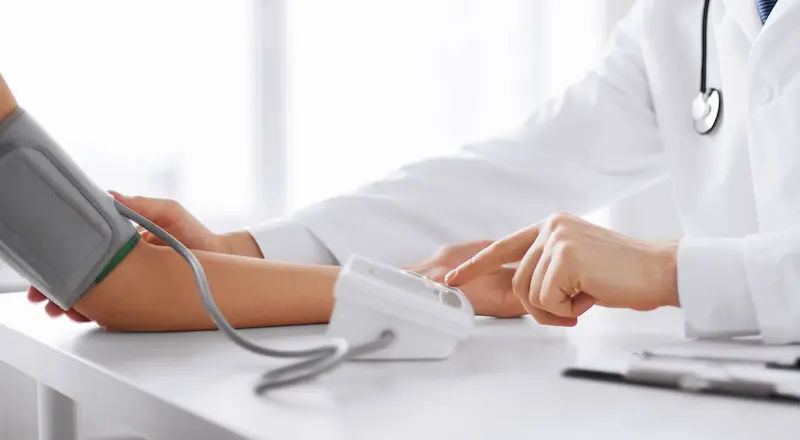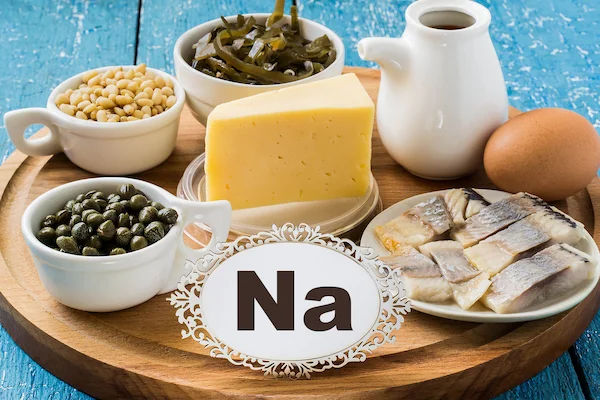Hypertension: Your Guide to Risks, Complications, and Prevention
Learn about hypertension, its risks, complications, prevention strategies, and management tips for better heart health.

Written by Dr. D Bhanu Prakash
Reviewed by Dr. Mohammed Kamran MBBS, FIDM
Last updated on 13th Jan, 2026

Introduction
Imagine your circulatory system as a complex network of pipes. Now, imagine the pressure inside those pipes constantly running too high. That’s the reality of hypertension, a common but serious medical condition where the force of your blood against your artery walls is consistently too high. Often called the "silent killer" because it typically has no warning signs, hypertension can quietly damage your body for years before symptoms appear. Understanding the risk factors and potential complications is the first and most crucial step towards taking control of your heart health. This guide will demystify high blood pressure, explain who is most at risk, detail the serious health complications it can cause, and provide actionable strategies for prevention and management. Your journey to better cardiovascular health starts here.
What is Hypertension? More Than Just a Number
At its core, hypertension is a measurement of the pressure your blood exerts as it flows through your arteries. It's not just a single number but a reflection of how hard your heart is working to pump blood throughout your body.
Systolic vs. Diastolic: Understanding the Reading
Every blood pressure reading consists of two numbers:
Systolic Pressure (Top Number): This measures the pressure in your arteries when your heart beats.
Diastolic Pressure (Bottom Number): This measures the pressure in your arteries when your heart is at rest between beats.
Both numbers are important, but for adults over 50, systolic pressure is often considered a more significant risk factor for cardiovascular disease.
The Hypertension Stages: From Elevated to Crisis
Blood pressure categories are defined by the American Heart Association:
Normal: Less than 120/80 mm Hg.
Elevated: Systolic between 120-129 and diastolic less than 80.
Hypertension Stage 1: Systolic between 130-139 or diastolic between 80-89.
Hypertension Stage 2: Systolic at least 140 or diastolic at least 90.
Hypertensive Crisis: Systolic over 180 and/or diastolic over 120. This requires immediate medical attention.
Who is at Risk? Unveiling the Causes of High Blood Pressure
Hypertension risk factors can be divided into two groups: those you can't change and those you can. Understanding this distinction is empowering.
Non-Modifiable Risk Factors (What You Can't Change)
Age: The risk of hypertension increases as you get older. Arteries can stiffen with age, contributing to higher pressure.
Family History: Hypertension tends to run in families. If your parents or close relatives have it, your risk is higher.
Race/Ethnicity: Individuals of African descent often develop hypertension at an earlier age and experience more severe complications.
Modifiable Risk Factors (What You Can Control)
This is where you have the power to make a difference.
The Salt and Stress Connection
A diet high in sodium (salt) causes your body to retain fluid, which increases blood pressure. Similarly, chronic stress can lead to temporary spikes in blood pressure, and over time, unhealthy coping mechanisms (like overeating or drinking) can contribute to long-term hypertension.
Health topic carousel:
Doctor's speciality: General Practitioner
Text: Consult a Specialist for the best advice
Weight, Inactivity, and Lifestyle Choices
Being overweight or obese forces your heart to work harder to pump blood. Lack of physical activity contributes to weight gain and increases the risk. Other key factors include smoking, which damages artery linings, and excessive alcohol consumption.
Why Uncontrolled Hypertension is So Dangerous: The Domino Effect
When high blood pressure is left unmanaged, it sets off a chain reaction of damage throughout the body. The constant force scars and stiffens your arteries, a condition known as arteriosclerosis.
Cardiovascular System: Your Heart Under Pressure
Your heart bears the brunt of hypertension.
Heart Attack and Coronary Artery Disease: Damaged arteries can become clogged with plaque (atherosclerosis), restricting blood flow to the heart muscle and causing a heart attack.
Heart Failure: When the Muscle Gives Out: The increased workload of pumping against high pressure can cause the heart muscle to thicken and eventually weaken, leading to heart failure. This is a serious condition where the heart can't pump enough blood to meet the body's needs. If you experience symptoms like shortness of breath, fatigue, or swelling in your legs, it’s crucial to consult a doctor. You can book a physical visit to a cardiologist with Apollo24|7 for a comprehensive evaluation.
The Brain: The Threat of Stroke and Cognitive Decline
Weakened or narrowed arteries in the brain can lead to a stroke, either from a blockage (ischaemic stroke) or a rupture (haemorrhagic stroke). Hypertension is a leading cause of strokes. It's also linked to mild cognitive impairment and dementia by affecting blood flow to the brain.
Your Kidneys: The Silent Casualties of Hypertension
The kidneys act as sophisticated filters for your blood. High pressure can damage the delicate blood vessels in the kidneys, reducing their ability to do their job. This can lead to kidney failure, requiring dialysis or a transplant. Apollo24|7 offers convenient home collection for tests like kidney function tests (KFT), which can help monitor the health of your kidneys if you have hypertension.
Eyesight and Sexual Health: The Lesser-Known Complications
Tiny, sensitive blood vessels in the eyes can be damaged by high blood pressure, leading to vision problems or even blindness (hypertensive retinopathy). In men, hypertension can contribute to erectile dysfunction by limiting blood flow.
Peripheral Artery Disease (PAD): When Legs Start Aching
PAD occurs when narrowed arteries reduce blood flow to the limbs, most commonly the legs. This can cause leg pain when walking (claudication) and increase the risk of infections.
Taking Control: Proactive Steps to Manage Your Blood Pressure
The good news is that hypertension is highly manageable.
The DASH Diet and Sodium Reduction
The Dietary Approaches to Stop Hypertension (DASH) diet is highly effective. It emphasises fruits, vegetables, whole grains, and lean proteins while reducing saturated fat and sodium. Aim for less than 2,300 mg of sodium per day, ideally moving towards 1,500 mg.
The Power of Regular Physical Activity
Aim for at least 150 minutes of moderate-intensity exercise (like brisk walking) per week. Regular activity strengthens your heart, allowing it to pump blood with less effort.
Stress Management and Quality Sleep
Chronic stress can keep your blood pressure elevated. Techniques like meditation, deep breathing, and yoga can help. Furthermore, aim for 7-9 hours of quality sleep per night, as sleep apnoea and poor sleep are linked to hypertension.
Conclusion
Hypertension may be common, but it should never be ignored. Left uncontrolled, it silently damages vital organs like the heart, brain, kidneys, and eyes—often with life-threatening consequences. The encouraging news is that with regular monitoring, healthy lifestyle choices, and proper medical guidance, high blood pressure can be effectively managed and even prevented. Small steps such as reducing salt intake, exercising regularly, managing stress, and getting enough sleep can make a big difference. By staying informed and proactive, you not only protect your own health but also set an example for your family and community. Remember—controlling blood pressure today means safeguarding your future tomorrow.
Health topic carousel:
Doctor's speciality: General Practitioner
Text: Consult a Specialist for the best advice
Consult Top Specialists for Personalised Tips
Dr. Srilekhya
Internal Medicine Specialist Diabetologist
10 Years • MBBS, MD (GENERAL MEDICINE)
Bengaluru
Apollo Medical Center, Marathahalli, Bengaluru

Dr. Shiv Krishna Mitra
General Physician/ Internal Medicine Specialist
15 Years • MBBS GEN. MED. PGDRM, MCH
Kolkata
Samaritan Clinic, Kolkata

Dr. Pinaki Mukhopadhyay
General Physician/ Internal Medicine Specialist
33 Years • MBBS
Kolkata
MCR SUPER SPECIALITY POLY CLINIC & PATHOLOGY, Kolkata
(25+ Patients)

Dr. Anindita Mondal
General Physician/ Internal Medicine Specialist
8 Years • MBBS
Kolkata
VDC Clinic, Kolkata

Dr. Ishita Mandal
General Surgeon
7 Years • MBBS(hons.), MS(general surgery), General and laparoscopic surgeon
Kolkata
VDC Clinic, Kolkata
Consult Top Specialists
Dr. Srilekhya
Internal Medicine Specialist Diabetologist
10 Years • MBBS, MD (GENERAL MEDICINE)
Bengaluru
Apollo Medical Center, Marathahalli, Bengaluru

Dr. Shiv Krishna Mitra
General Physician/ Internal Medicine Specialist
15 Years • MBBS GEN. MED. PGDRM, MCH
Kolkata
Samaritan Clinic, Kolkata

Dr. Pinaki Mukhopadhyay
General Physician/ Internal Medicine Specialist
33 Years • MBBS
Kolkata
MCR SUPER SPECIALITY POLY CLINIC & PATHOLOGY, Kolkata
(25+ Patients)

Dr. Anindita Mondal
General Physician/ Internal Medicine Specialist
8 Years • MBBS
Kolkata
VDC Clinic, Kolkata

Dr. Ishita Mandal
General Surgeon
7 Years • MBBS(hons.), MS(general surgery), General and laparoscopic surgeon
Kolkata
VDC Clinic, Kolkata
More articles from High Blood Pressure
Frequently Asked Questions
If I start medication, do I have to take it forever?
Can I have high blood pressure and feel fine?
What is considered a dangerously high blood pressure reading?
A reading above 180/120 mm Hg is a hypertensive crisis. If you get this reading, wait a few minutes and check again. If it remains this high, seek emergency medical care immediately.
Are there specific symptoms of high blood pressure in women?
Generally, hypertension is symptomless regardless of gender. However, during pregnancy, high blood pressure (pre-eclampsia) can present with symptoms like severe headaches, vision changes, and upper abdominal pain, which require immediate attention.
How can I lower my diastolic blood pressure specifically?
The same lifestyle changes that lower overall blood pressure—reducing salt, exercising, managing weight, and limiting alcohol—will effectively lower both systolic and diastolic numbers. There isn't a separate method for diastolic pressure.




